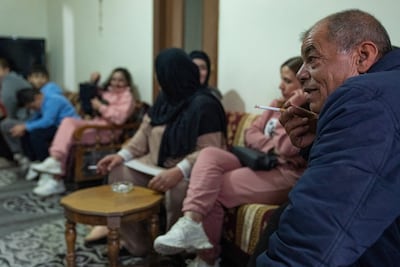Live updates: Follow the latest on Israel-Gaza
Zainab Sharaf was in the middle of making breakfast for her family on Wednesday when she heard the Israeli drone circling over her house. "It was unnaturally close to us," she recalled. "I was so scared that I didn't dare look up."
Then her neighbours told her they had received calls from the Israeli army ordering them to leave the area, despite their village, Hawsh Al Rafiqa, not being listed on the displacement demand it had issued for Baalbek and surrounding areas that morning.
Ms Sharaf said this was the first time she felt fear since Israel started a massive bombing campaign against Iran-backed Hezbollah in late September. Until Israel's eviction order came, she had managed to keep telling herself: "It's OK, they won't strike here. We're safe for now."
But her sense of relative safety evaporated when she heard the drone directly above her house. "In that instant everything changed," she said when The National visited the Bekaa valley on Wednesday, just hours after the wave of mass displacement from Baalbek began.

Hussein Shehade, Ms Sharaf's brother-in-law, said the displacement order felt "like a long-brewing storm that had finally landed at our doorstep".
Ms Sharaf stopped cooking, grabbed her purse, gathered her family and immediately fled south to Zahleh, a mainly Christian city that was already hosting about 1,440 people displaced by Israeli attacks, according to the International Organisation for Migration. She arrived with her family and next-door neighbours.
"We didn't take anything with us," she said. "If it gets struck, we can always rebuild our house. But if we die, we can't rebuild our souls."
The Sharaf family are now staying with her long-time friend Nejmeh Touma, who for the past month had already been hosting a family of five. Altogether, there are now 20 people living in one apartment.
"Our Christian siblings welcomed us as if we were family," Ms Sharaf said.
She now shares a room with her neighbours, including Anaya Hanieh and her family, also close friends of Ms Touma's, who fled their home on the first day of Israel's expanded bombardment.
Ms Sharaf acknowledges that her new reality – sharing a home that is not hers with 19 other people – is not ideal, but has a practical outlook on the situation: They are the lucky ones.
Finding a place to stay amid the chaotic mass flight from Baalbek and its outskirts has been a near-impossible task for many who were forced to leave their homes but had nowhere to go. The Sharaf family say they saw such people sleeping in their vehicles along the side of the road.
As the war continues throughout Lebanon, houses available for rent are becoming increasingly scarce for displaced people. Many families are met with suspicion by people living in the area who fear that they might have ties to Hezbollah. Shelters are already overcrowded from earlier waves of displacement.
Israel's attacks have caused widespread destruction across Lebanon, particularly in the south, the capital Beirut and in the Bekaa Valley, including Baalbek, on the border with Syria.
About 1.4 million had already been displaced since Hezbollah and the Israeli military began exchanging fire across the southern border in October last year, according to Lebanese government estimates, but Wednesday was the first time Israel has ordered an entire Lebanese city and its outskirts to be vacated.
Baalbek Mayor Mustafa Al Chal said most residents left the city and its outskirts within hours of the Israeli order. Roads out of the area were clogged with traffic.
“The majority of people have been displaced to areas near Baalbek, mostly Christian areas in the north,” Mr Al Chal told The National. In Arsal and Deir Al Ahmar, officials have hurriedly set up shelters to host them.
The National passed through villages near Baalbek that had been almost completely abandoned in the hours following the Israeli order. A worker at one of the few open roadside petrol stations said even people living outside the zone of the Israeli army’s displacement order had left in a rush.
By afternoon, the Israeli army began bombarding Baalbek, home to ancient ruins listed among Unesco heritage sites. "Nowhere is safe. Not even the ruins," Mr Al Chal said.

The Israeli military said it was attacking Hezbollah sites, although recent visits to the region by The National suggest that most casualties there have been civilians.
“Don't worry, God is with us,” said Ali Allam, director of Baalbek's Dar Al Amal Hospital, where hundreds of people injured in earlier attacks were being treated on Wednesday. The hospital had not been evacuated following the Israeli threats because there were too many patients to move. Earlier this week, Israeli air strikes killed about 67 people and wounded at least 120 across the Baalbek-Hermel region: it was the “most violent day” for the area since the war began.
More than 2,700 people have been killed in the year-long conflict between Israel and Iran-backed Hezbollah. Most of the deaths and displacement occurred over the past six weeks, when Israel refocused its war objectives from eliminating Hamas in Gaza to eliminating Hezbollah in Lebanon.
Mrs Touma, the woman who opened her home to over a dozen of her displaced friends, said she never hesitated to do so.
"They're my friends. And what have they done to deserve being forced out of their homes?" she asked. "These are innocent people, and they're suffering. "
